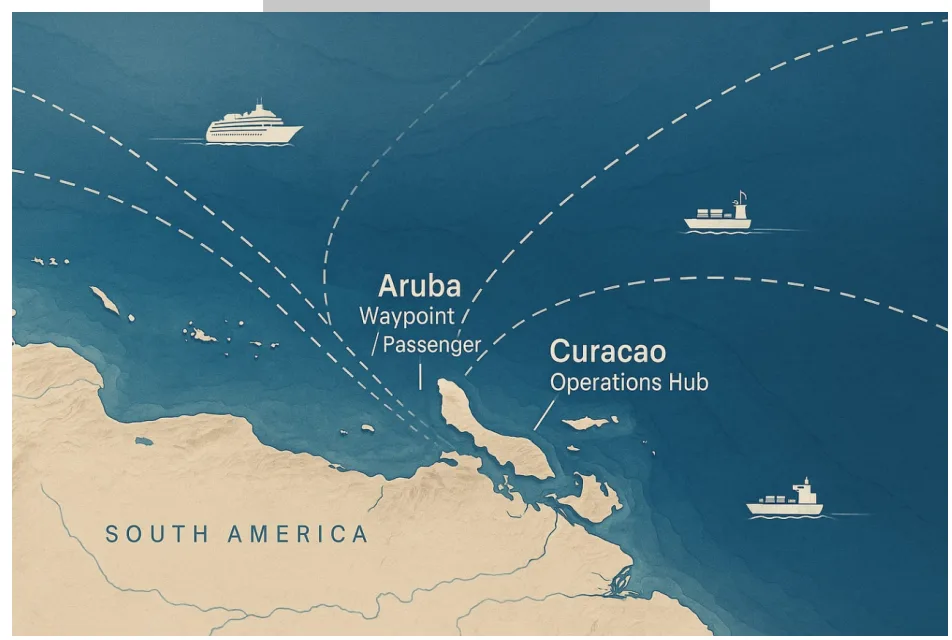How Aruba And Curaçao Work Together In Caribbean Port Logistics
The southern Caribbean is a busy lane for tankers, general cargo, Ro-Ro, reefers, and cruise ships moving between South and North America.
Within this corridor, Aruba and Curaçao operate like complementary gears in the same machine. One offers proximity and access to key routes. The other brings deep-water capacity, predictable turnaround, and a wide spread of marine services.
Together, they make planning and execution in Caribbean port logistics faster, safer, and more reliable for operators who value schedule integrity and cost control.
One Corridor, Two Roles
Aruba and Curaçao sit just off the Venezuelan coast, outside the main hurricane belt and near major north–south and east-west sailings.
This position is useful for diversions, schedule recovery, and mid-voyage service calls. Aruba handled 897,273 cruise passengers in 2024, underscoring its pull as a waypoint for both cruise and cargo traffic.
In practice, the islands fill different roles:
- Aruba is a convenient waypoint for vessels transiting the southern Caribbean and a popular cruise destination. A port agency in Aruba ensures smooth operations for ships taking advantage of the island’s sheltered anchorages and its proximity to major routes connecting Colombia, Panama, and the eastern Caribbean.
- Curaçao functions as a workhorse hub. Deep-water berths, reliable pilotage and towage, and round-the-clock operations allow for quick calls. The island supports transhipment, project cargo handling, spares and stores delivery, crew logistics, and ship services in port or OPL.
This split is not a competition. It is a division of labor that lets shipowners and charterers pair Aruba’s location advantages with Curaçao’s infrastructure to keep voyages on time.
Why Curaçao Is The Preferred Operations Base
For owners who measure success in hours saved and risks avoided, Curaçao often becomes the operational center of gravity. Typical reasons include:
- Depth and access. Deep-water approaches and efficient pilotage reduce draft constraints and cut idle time.
- 24/7 readiness. Cargo handling, bunkering coordination, and technical attendance can be arranged day or night within predictable windows.
- Vendor ecosystem. From tugs and line handlers to crane hire, bonded warehousing, certified potable-water supply, and technical workshops, the island concentrates essential services close to berth.
- OPL flexibility. When a quick turn is enough, many services can be arranged at a safe offshore location to keep main engines warm and schedules tight.
The result is fewer unknowns. A single call can combine spares delivery, crew change, freshwater, waste reception, and store replenishment with minimal shifting and paperwork repetition. In Caribbean port logistics, that kind of consolidation is a competitive advantage.
How the Aruba-Curaçao Routing Works In Practice
When a voyage plan initially points to Aruba, operators often ask: can we handle the heavy lifting in Curaçao while still meeting Aruba-related commitments?
The answer is usually yes, and the workflow is straightforward. When the plan includes Aruba, confirm Aruba port agency requirements alongside pre-arrival paperwork.
- Pre-arrival planning. The agent confirms ETA windows, drafts, and required services. Pre-arrival notifications are lodged with the relevant authorities. Crew lists, store lists, manifests, and any class or flag documents needed for attendance are checked for completeness.
- Port or OPL call in Curaçao. The vessel executes the work package: crew change, medical attendance, spares delivery, bonded stores, freshwater, lube oil, garbage or slops reception, minor repairs, or cargo operations as planned. Clearances and port charges are handled through a single point of contact.
- Onward leg alignment. With the ship squared away, the operator can route to the next waypoint. If Aruba remains on the voyage plan, the Curaçao call ensures the vessel arrives on time and well prepared for local requirements.
This approach gives owners the infrastructure and service breadth of Curaçao while keeping Aruba within reach for itinerary, commercial, or passenger reasons.
The Compliance Side: Fewer Handoffs, Cleaner Audits
Every handoff introduces variability. Aligning ship services in Curaçao minimizes that by centralizing documentation and authority interactions:
- Customs and immigration are handled through one agent and one unified pre-arrival pack.
- Security and safety matters follow a consistent local playbook that supports ISPS compliance.
- Environmental services such as waste and slops reception are booked with vetted providers who document and certify reception according to MARPOL requirements.
- Recordkeeping is cleaner. Receipts, declarations, and service certificates are collated in a single call file that stands up to audit.
For operators, that means easier post-voyage reconciliation and fewer surprises during inspections.
Cost And Time: Where The Savings Appear
Choosing Curaçao as the operational base often pays back in three ways:
- Shorter port stays. Service providers are coordinated to overlap tasks and reduce shifting.
- Lower risk premiums. Predictable pilotage, towage, and berth windows cut exposure to delays.
- Fewer returns. When multiple needs are solved in one stop, you avoid additional calls that burn bunker and time.
In Caribbean port logistics, the math is simple. The least complicated plan with the fewest failure points usually wins.
What Ship Operators Can Expect From a Curaçao-first Setup
Choosing Curaçao as the service base turns a multi-stop checklist into one coordinated call. You get predictable windows, fewer handoffs, and a single team orchestrating vendors and paperwork.
The outcome is tighter ETAs, cleaner compliance, and less time off-hire.
- A single point of contact for pilotage bookings, towage, mooring, and berth allocation
- Coordination for bunkers, lubes, freshwater, provisions, and bonded stores
- OPL service options when a fast turn is more efficient than a full port call
- Technical support, surveys, and small repairs arranged to coincide with other operations
- End-to-end crew logistics, including visas, transport, and accommodation
- Clear, itemized documentation and invoicing delivered promptly after sailing
That is the framework that keeps vessels on schedule and budgets on track while treating Aruba calls as part of a broader, optimized corridor plan.
Plan Once, Execute Cleanly
Caribbean shipping always rewards preparation.
Aruba’s position and passenger appeal, combined with Curaçao’s depth and service concentration, give operators a practical way to absorb disruption, regain the schedule, and satisfy commercial obligations without juggling multiple, thinly spread providers.
Treat the two islands as partners in a single routing strategy, make Curaçao your service base, and you will feel the difference in your ETA confidence and your cost lines.
Meta title: Aruba & Curaçao: Partners in Caribbean Port Logistics
Meta description: See how Aruba and Curaçao complement each other in Caribbean port logistics, with Curaçao as the service hub for faster, safer, and more predictable calls.
Slug: /aruba-curacao-partner-in-caribbean-port-logistics
Focus Keyword: Caribbean port logistics
Image: SeaHarbor – How Aruba And Curaçao Work Together In Caribbean Port Logistics – October 2025






